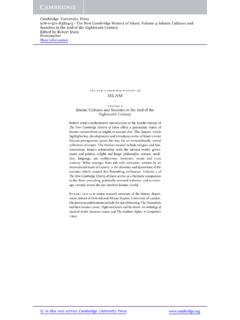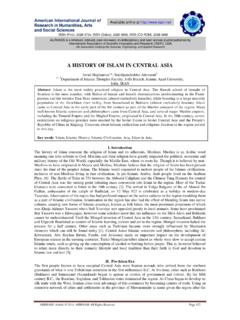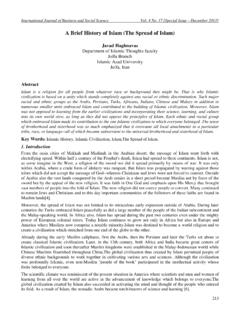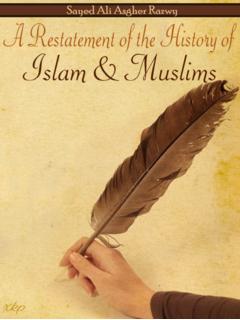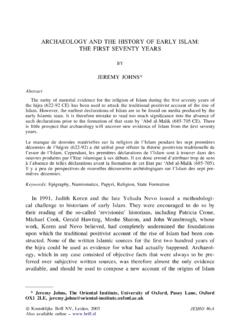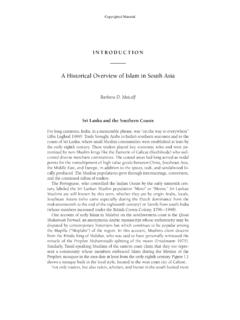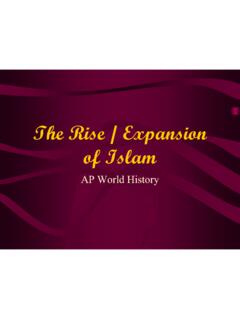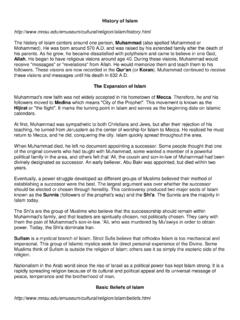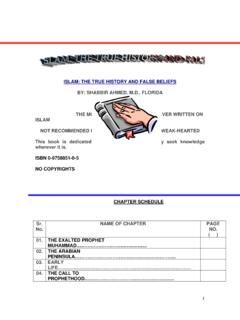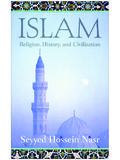Transcription of A History of Knowledge - Piero Scaruffi
1 1 A History of Knowledge Oldest Knowledge What the Sumerians knew What the Babylonians knew What the Hittites knew What the Persians knew What the Egyptians knew What the Indians knew What the Chinese knew What the Greeks knew What the Phoenicians knew What the Romans knew What the Barbarians knew What the Jews knew What the Christians knew Tang & Sung China (618-1368) What the Japanese knew What the Muslims knew The Middle Ages Ming & Manchu China The Renaissance The Industrial Age The Victorian Age The Modern World 2 What the Muslims knew Piero Scaruffi 2004 The worst things are those that are novelties. Every innovation is an error, and every error leads to hell. (Mohammed, The Neglected Duty) The basis of government is jugglery. If it lasts and works, it becomes policy. (Caliph Al Mansur of Baghdad) 3 What islam knew Bibliography Ira Lapidus: A History of Islamic Societies (1988) Albert Hourani: A History of the Arab peoples (1991) Bernard Lewis: The Middle East (1995) John Esposito: History of islam (1999) Vernon Egger: History of the Muslim World to 1405 (2003) Majid Fakhry: A History of Islamic Philosophy (1970) Michael Jordan: islam - An Illustrated History (2002) Edgar Knobloch: Monuments of Central Asia (2001) Huseyin Abiva & Noura Durkee: A History of Muslim Civilization (2003) Vernon Egger: A History of the Muslim World to 1405 (2003) David Banks: Images of the Other - Europe and the Muslim World Before 1700 (1997) Reza Aslan: No God but God (2005) 4 What islam knew Bibliography Yohanan Friedmann: Tolerance And Coercion in islam - Interfaith Relations in the Muslim Tradition (2006) Bat Ye'or: islam and Dhimmitude (2001) David Ayalon.
2 Outsiders in the Lands of islam (1988) Humphrey Fisher: Slaves and Slavery in Muslim Africa (1986) Allan Fisher: Slavery and Muslim Society in Africa (1971) 5 The Roman and Persian empires in 600 6 islam 1500 BC: the Jewish patriarch Abraham (Ibrahim) founds the shrine of Mecca ("kaaba") 350: the Aramaic-speaking Nabataeans (Jordan) develop the Arabic script 460: Persian king Firuz persecutes Jews, who emigrate to Arabia 500: southern Arabia is ruled by a Jewish kingdom 525: the Jewish king Dhu Nuwas of Yemen dies and Yemen becomes an Ethiopian (Christian) colony 610: Muhammad (Mohammed) preaches in Mecca 622: Mohammed and his followers migrate ("heijra") to Yathrib, which is renamed Medina 632: Schisms between Shiites and Sunnites, who choose Abu Bakr as the first Muslim caliph ("prophet's successor") 7 islam 632: Abu Bakr declares war on the Roman and Persian (Sassanid) empires 636-42: the Arabs capture Jerusalem, Persia, Syria, Egypt 661: Ali is murdered and is succeeded as caliph by Mu'awiya ibn Abi Sufyan, first of the Umayyads 661: The capital moves to Damascus (in Syria rather than Arabia) 696: Arabic becomes the official language of the Islamic world 708: Arabs conquer Tangiers (Morocco) 709: Arabs invade Central Asia 711: The Arabs conquer southern Spain from the Visigoths 8 islam 732: the Muslim invasion of Europe is stopped by the Franks 749: the Abbasid dynasty replaces the Umayyad dynasty 751: the Arabs defeat the Chinese at the battle of the Talas River, de facto closing the Silk Road 9 The Arab empire in 750 Lyon-Rowen-Hamerow: A History of the Western World (1969) 10 islam 756: the last surviving member of the Umayyad dynasty flees to Spain, establishing a separate caliphate 762.
3 The Abbasid caliph Al-Mansur moves the capital from Damascus to Baghdad (near the old Persian capital) 809: caliph Harun Rashid dies, after expanding the caliphate from Gibraltar to the Indu river and having started translations of Greek manuscripts 825: caliph Al-Mamun sponsors translations for his house of wisdom 825: Al Khwarizmi of Baghdad writes a book on "Hindu numerals" 867: the Saffarids (Shiite) in eastern Persia become independent 868: Egypt proclaims independence 945: the Buyids (Shiite) invade Persia from the Caspian Sea 962: the Ghaznavid kingdom is founded in Afghanistan 11 Eastern islam in 1000 12 islam 622-660: Early expansion 661-748: Umayyads 749-1258: Abbasids 868-962: Islamic kingdoms 992-1194: Seljuqs (Iran, Turkey) 1096-1291: Crusades (Palestine) 1212-1492: Christian reconquista (Spain) 1263-1335: Ilkhanate (Iran) 1301-1571: Ottoman expansion 1846-1956: European colonization 1952- : Islamic nationalism 13 What the Muslims knew The age of ignorance / Jabiliyyah Desert Ghazw/ Razzia (Bedouin raid) North Arabian saddle (that turns camels into means of transport and combat animal) Long-distance travel across deserts that had blocked the expansion of Mediterranean powers Camel-breeding nomads control commercial networks 14 What the Muslims knew Poetry Qasida (pre-Islamic desert encampment ode) Exaltation of one's tribe Longing for the loved one Ghazal (love poem) 10th c: Maqamat (epic rhymed prose mixed with religion, politics, geography, written in virtuoso forms) 15 What the Muslims knew Arabic A semitic language Oldest inscription in Arabic: 1st c BC (in Musnad script) Arabic alphabet evolved (4th c) from the Nabataean/ Syriac variation of the Aramaic alphabet Oldest Arabic fragment in Nabataean alphabet.
4 Epitaph for the Arab poet and warlord Imru'ul-Qays (Syria, 329 AD) Oldest Arabic fragment in the Arabic alphabet: Jabal Ramm, Jordan (4th century AD) 16 What the Muslims knew Arabic Arabic inscription in Musnad script (Saudi Arabia, 1st c BC) 17 What the Muslims knew Arabic The Nabataean alphabet could represent 22 phonemes, but Arabic has 28 phonemes: 6 Nabataean letters represented two Arabic phonemes each Cursive Nabataean writing evolved into Arabic writing but with more ambiguities (only 17 letters were different in shape, one letter represented 5 phonemes, one represented 3 phonemes and 4 each represented 2 phonemes) Disambiguation dots (Quranic era) to disambiguate phonemes Disambiguation vowels (Al Farahidi, 786) Kufic script (Arabia for Caliph Umar s death, 646 AD) 18 What the Muslims knew Arabic PERF 558: oldest surviving Arabic papyrus, found in Heracleopolis in Egypt A bilingual Arabic-Greek tax receipt ("Document concerning the delivery of sheep to the Magarites and other people who arrived, as a down-payment of the taxes of the first indiction ) Disambiguating dots Islamic formula "Bismillah ir-rahman ir-rahim" (In the Name of God, the Merciful, the Compassionate) Dated both in the Islamic calendar (Jumada I, year 22) and in the Coptic calendar (30 Pharmouthi, 1st indiction or AD 642) It calls the Arabs "Magaritae (immigrants?)
5 And "Saracens" 19 What the Muslims knew Arabic Tombstone Of `Abd al-Rahma-n Ibn Khair al-Hajri (652 AD) in Kufic script (Cairo Museum) 20 What the Muslims knew Pre- islam Arabia North Arab kingdoms under Hellenistic and Byzantine influence Nabatean kingdom in Jordan (5th c BC - 105) Palmyra kingdom in Syria (3rd c BC - 273) Until the 1st c AD Arab seamen are the only one to know the effects of the monsoon on sea travel (the only one who can sail to the Far East) 21 What the Muslims knew Pre- islam Arabia Bedouin life organized around the tribe Endless wars among Bedouin tribes Complex network of alliances Social egalitarianism Shaykh elected as first among equals to keep peace within the tribe and demand respect from other tribes (not hereditary) Hakam plays the role of the judge Decisions made by hakams become the sunna , the ethical code of a tribe Different tribes have different sunnas 22 What the Muslims knew Pre-Islamic Arabia Communal life of the tribe Women are property of men The harem is the status symbol of a shaykh Both men and women practice polygamy No individual inheritance Paternity is unimportant (matrilinear society) Polyandrous marriages allowed Bedouins are polytheists and animists 23 What the Muslims knew Jews Jews expelled from Palestine by the Romans after the 70 and 132 insurrections Yathrib (Medina) originally settled by Jews Jewish merchants Jewish Bedouins Jewish farmers Jewish poets Jewish warriors Symbiotic relationship between Jews and Arabs (Jews heavily Arabized, but Arabs heavily influenced by Jewish beliefs) 24 What the Muslims knew Pre- islam Arabia 525.
6 The Himyarite kingdom converts to Judaism 530: Christian Ethiopia invades south Arabia 575: The Persian Sassanids invade south Arabia 608: The Kaaba, a shrine to many Arabian tribal gods, is erected in Mecca 25 What the Muslims knew Pre- islam Arabia Eastern Roman Empire (Byzantium): Christian Sassanid Empire (Persia): Zoroastrian Yemen: Jewish Ethiopia: Christian Arabia is the only place where Zoroastrian, Christian and Jewish monotheistic religions coexist In the 7th century Arabia surrounded by Christians (Syrians, Mesopotamians, Abyssinians) Ghassanid tribe protects Roman borders of Arabia Lakhmid tribe protects Persian borders of Arabia 26 What the Muslims knew Pre- islam Arabia Arab historians: Ibn al-Kalbi (7th c AD) Azraqi (8th c AD) Tabari (9th c AD) Ibn Ishaq (th c AD) 27 What the Muslims knew Mecca Sanctuary for many gods Mecca before Mohammed: a model of religious tolerance Annual pilgrimage (haji) to Mt Arafat Allah: lord of the Kaaba Three daughters of Allah: Manat, Allat, AlUzza Mecca before Mohammed: a model of gender equality Similar to the religion of Palestine in 6th c BC (Yahweh, Bethel, Arat, Harambethel) Only monotheists: the hanif (poets and visionaries) 28 Ancient Arabia Meccan shrine (Kaaba) A model of religious tolerance Nabataean gods ( , Kutba) Goddess Uzza (Isis, Aphrodites) Jesus and Mary Three daughters of Allah: Allat/Astarte, al-Uzza, Manat Hubal, the Syrian god of the moon, chief god of Mecca Oracles (kahin) interpret the gods through ecstatic poetry (modeled after Delphi s oracle) 29 Ancient Arabia Meccan shrine (Kaaba) Ancient belief: the Kaaba was built by the first man, Adam, destroyed by the flood, rebuilt by Noah, rediscovered by Abraham/Ibrahim Quran s version.
7 Allah commanded Abraham/Ibrahim and his son Ishmael/Ismail to build the Kaaba Original Kaaba: a cube of unmortared stones 360 idols Pilgrims travel to Mecca (hajj) and rotate around the Kaaba seven times (tawaf) Probably a cosmic metaphor (360 days of the year, seven astral bodies) 30 Ancient Arabia Meccan shrine (Kaaba) Widespread cult of stones Nomads carry stones in portable shrines Nabateans and Syrians worshipped stones (Elagabalus, son of a Syrian woman, brought one to Rome when he became emperor in 216 AD) Pilgrims took stones from Mecca with them 31 Ancient Arabia Meccan shrine (Kaaba) Located near the zamzam well, that was probably a popular stop for caravans But most trade routes do not cross Mecca No evidence of commercial activity in Mecca other than selling goods to pilgrims and taxing pilgrims No signs left of wealth (unlike Palmyra or Petra, where wealth translated into great buildings)
8 Not a city at all until the 5th c AD There were monotheists before Mohammed: poet Zayd ibn Amr (opposed to Judaism, Christianity and later islam ) 32 Ancient Arabia Meccan shrine (Kaaba) 5th century: Qusayy gains control of Mecca, collects nearby idols, creates a monopoly of pilgrimage and establishes the tribe of Quraysh (descendants of Ismail) as the wardians of the shrine ( the tribe of god ) Qusayy creates an economic empire based on the lucrative captive market of pilgrims and on the advantages provided by the Kaaba Mecca as a sanctuary is exempt from warfare The great commercial fairs coincide with the pilgrimage cycle But the wealth of the Meccan elite violates the egalitarian spirit of the tribe and creates social layers 33 Ancient Arabia Meccan shrine (Kaaba) Usury Accumulation of individual wealth Individual inheritance Patrilinear society 34 Ancient Arabia Mecca and Medina Mecca: transition from bedouin pastoral society to center of trade (replacing Petra and Palmyra) Medina: transition from bedouin pastoral society to agriculture Mecca: polytheistic Medina.
9 Mostly Jewish 35 What the Muslims knew Mecca Legend Sanctuary founded by Ibrahim (Abraham) around the Cube (Kaaba) City settled by Ishmael Archeological/historical record No major trade route near Mecca in ancient times Most ancient mosques in Egypt and Jordan originally oriented towards Jerusalem, not Mecca Contemporary Roman and Persian documents refer to other Arab cities but not to Mecca 36 What the Muslims knew Arabian economy Traders Arabian trade routes to India become strategic to the Romans because of continuous warfare against the Sassanids. Collapse of the western Roman empire causes chaos in the western Mediterranean The camel overland (north Africa) and the dhow on the sea (Indian ocean) Drought in Arabia Decline of the Silk Road and rise of the Muslim trade with China and India islam first spreads in regions that have chronic scarcity of freshwater (north Africa, Middle East, southern Spain) 37 What the Muslims knew Arabian economy Indigo 38 What the Muslims knew Eastern Roman Empire (Byzantium): Christian Persian Empire (Sassanids): Zoroastrian Ethiopia: Christian Yemen: Polytheistic (Allah one of the gods) What they did not know.
10 Previous civilizations of the Middle East (Sumers, Babylonia, Assyrian, Hittite) 39 What the Muslims knew The legacy of Judaism Mohammed prayed towards Jerusalem (until 624) Mohammed worshipped the temple built by a Jew, Abraham, in Mecca Mohammed founded islam on the Ancient Testament Most ancient mosques oriented towards Jerusalem, not Mecca St John Damascene (675-749) considered islam a heterodox form of Christianity Recent excavations in t
